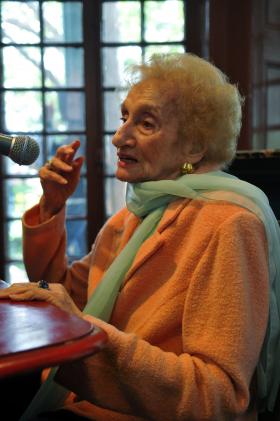Writer shares experience with Nazi Germany
The Daily Pennsylvanian
April 14, 2011

-
Ruth Gruber spoke about her experiences writing about Nazi Germany at the Kelly Writers House. (John Sim/DP Staff Photographer)
At 19 years old, Ruth Gruber became the youngest student ever to receive a doctorate. In her 20s she started her writing career, becoming one of the first journalists to report on fascism and the Holocaust. By 34, she became a simulated general in the United States Army. And at the age of 99, Gruber visited the Kelly Writers House to tell her life story to Penn students.
The Writers House and the Jewish Studies department hosted a lunchtime discussion Thursday with Gruber, a journalist and humanitarian.
"It's predicted to be the best program that's ever happened at the Writers House," Writers House faculty director Al Filreis said.
Gruber first visited Germany as an exchange student after receiving a fellowship to study there. A Brooklyn-born Jew, Gruber noted she faced opposition from her parents due to the political atmosphere in Europe.
"My mother was fairly hysterical. She said, 'Hitler could come down and shoot you.' I knew when it was time for me to go to Germany. [I told my parents,] 'I have to find what it is about this mad man that has captured the country,'" Gruber said.
It was during her time in Germany that Gruber received her doctorate from the University of Cologne. More influential in her life, however, were the events that caused her to realize fascism was on the rise. At one point, Gruber attended a Nazi rally despite the opposition of her Jewish host family.
"It was a terrifying experience, I must admit," she said. "I kept hearing that voice [of Hitler]: 'death to Israel, death to Jews.'"
Despite what she witnessed at the rally, Gruber found that her fear of the growing fascism in Europe was often ignored.
"They all said 'he’s a clown, he looks like Charlie Chaplin, in a year he'll be finished.' No one believed me," she said. "I kept watching every election, and the Nazis would win them all. I kept asking how they could take a country that was so democratic … little by little, they were capturing that once wonderful democracy that was Germany."
Gruber met similar opposition and skepticism when returning home to America.
"There were people in the State Department who were anti-Semites — good, orthodox anti-Semites," Gruber said.
On the request of the Secretary of the Interior, Gruber went back to Germany during World War II in 1944 to help bring 1,000 Jewish refugees to America. During this trip, she would record the histories of the refugees.
"All their stories moved me because they were all so tragic … we cannot picture what Nazis did to those people," she said. "I start shaking when I think about it. I'd have to stop writing because my tears would cover [my notebook]."
For many, the event hit close to home, proving to be an emotional experience.
"I called [Penn] and urged them to bring this remarkable woman to Penn," said Emilio Bassini, a Penn parent and College and Wharton alumnus who funded the event. "I hope this is a life-alternating moment for all of you as well because this is what the Writers House is all about," he addressed the audience of about 60.
"She has a fascinating story. I actually am extremely interested in the Holocaust. I really wanted to come here and bear witness to such an inspirational person," College freshman Ross Karlan said.
